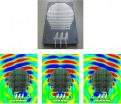(Press-News.org) Scientists found that the molecule, called microRNA 135b, is a vital 'worker' employed by several important cancer genes to drive the growth of bowel cancers.
Drugs targeted at the microRNA could knock out the effects of multiple cancer-causing mutations at once, while tests for it could identify patients with the most aggressive disease, the researchers believe.
The research was carried out by an international team including scientists based at The Institute of Cancer Research, London, the University of Glasgow and Ohio State University in the US.
Scientists tested for microRNA 135b in 485 patients with bowel cancer and found that levels were at least four times as high in tumours as in healthy tissue, and that patients with the highest levels survived the least long.
They showed that blocking the microRNA stopped tumour growth in bowel cancer mouse models, and in half of them tumours regressed so dramatically they could no longer be seen by imaging. Mice didn't show any side-effects as a result of treatment.
The study is published today (Monday) in the prestigious journal Cancer Cell, with funding for the UK research team coming from the Kimmel Cancer Foundation, Cancer Research UK, The Marie Curie Actions Programme and a Scottish Senior Clinical Research Fellowship.
MicroRNAs are small strands of genetic material that regulate gene activity and are involved many cellular processes.
The study showed that a number of known cancer gene mutations, such as APC, PI3KCA, SRC and p53, exercise their effects through microRNA 135b.
Although treatments targeting bowel cancer mutations have been developed, patients often develop resistance. Inhibiting microRNA 135b could be an exciting way to attack cancers without resistance occurring by blocking the effects of multiple cancer-causing mutations simultaneously.
The findings also suggest that testing levels of microRNA 135b could help identify patients likely to develop aggressive bowel cancer, and who might need the most intensive treatment.
Lead author Dr Nicola Valeri, Leader of the Gastrointestinal Cancer Biology and Genomics Team at The Institute of Cancer Research, London, said:
"We have shown that a specific microRNA can drive the development of bowel cancers and is a key 'worker' responsible for putting into action the instructions from many cancer-causing mutations. Patients with the highest levels of this molecule have the most difficult-to-treat cancers, and inhibiting the molecule in mice prevents tumours from growing. Although the research is at an early stage, our findings may have an important impact in the way we treat patients with bowel cancer in the future."
Professor Paul Workman, Deputy Chief Executive of The Institute of Cancer Research, London, said: "This work sheds light on the important role of microRNAs in bowel cancer and opens up a potentially exciting new avenue for cancer treatment. It also gives us a marker of disease that might prove valuable in the clinic to predict which patients have a more aggressive cancer.
"MicroRNAs play a vital role in the cells in our body, both in normal functions and in disease. We have known for a while that microRNAs are important in cancer, but their diversity of roles has meant it's been difficult to target them with drugs without causing toxic side-effects. This particular RNA has a huge advantage that might allow us to avoid this toxicity, because it is found in very low levels in normal tissue and in high levels in cancer."
Professor Owen Sansom, Deputy Director of The Cancer Research UK Beatson Institute at Glasgow University, said: "This exciting work shows a single microRNA can control multiple pathways that go wrong in colon cancer and offers the hope that in the future this could be targeted in patients that have colon cancer."
INFORMATION: END
'MicroRNA' could be key target for bowel cancer treatment
A tiny genetic molecule known as a microRNA plays a central role in bowel cancer and could be key to developing new treatments for the disease, a new study concludes
2014-04-14
ELSE PRESS RELEASES FROM THIS DATE:
Study identifies a likely key driver of colorectal cancer development and progression
2014-04-14
COLUMBUS, Ohio – A new study identifies a molecule that is a probable driving force in colorectal cancer and suggests that the molecule could be an important target for colorectal cancer treatment and a valuable biomarker of tumor progression.
The study of microRNA-135b (miR-135b) in two animal models and human tumors was published in the journal Cancer Cell and was led by researchers at The Ohio State University Comprehensive Cancer Center – Arthur G. James Cancer Hospital and Richard J. Solove Research Institute (OSUCCC – James) and at the University of Glasgow in ...
Dietary supplement use among US adults more prevalent than previously thought
2014-04-14
Washington, D.C., April 14, 2014—Dietary supplement use by U.S. adults is more prevalent than indicated by published data from the National Health and Nutrition Examination Surveys (NHANES), according to a new article in the peer-reviewed Journal of the American College of Nutrition (JACN). The review article is based on five consecutive years of online market research studies, conducted by Ipsos Public Affairs for the Council for Responsible Nutrition (CRN).
According to Annette Dickinson, Ph.D., corresponding author and a consultant for CRN, "This new review adds to ...
Young dads at high risk of depression, too
2014-04-14
CHICAGO --- Depression can hit young fathers hard -- with symptoms increasing dramatically during some of the most important years of their children's lives, a new Northwestern Medicine® study has found.
Depressive symptoms increased on average by 68 percent over the first five years of fatherhood for these young men, who were around 25 years old when they became fathers and whom lived in the same home as their children. The results of the study were published April 14 in the journal Pediatrics.
This study is the first to identify when young fathers are at increased ...
Osteoporosis drugs appear to impede cell membrane repair
2014-04-14
AUGUSTA, Ga. –A class of drugs widely used to treat osteoporosis appears to impede a cell's ability to repair a protective outer membrane that helps determine what enters and exits, researchers report.
The inability to quickly repair a membrane is lethal to a cell and may help explain the rare and serious side effect of jawbone destruction that can occur following dental work in patients taking these drugs, said Caroline Lewis, a sophomore at the Medical College of Georgia at Georgia Regents University.
"The bottom line is it inhibits cell membrane repair in two distinct ...
Long-term antibiotic treatment for Q fever causes weight gain
2014-04-14
Scientists have unearthed still more evidence that antibiotics can contribute to obesity. Research published ahead of print in the journal Antimicrobial Agents and Chemotherapy suggests that patients on long-term antibiotic treatment gained weight and had significant changes in their gut microbiota.
The study, led by Didier Raoult, of Aix-Marseille University, Marseille, France, followed 48 patients who were being treated long-term with doxycycline and hydroxychloroquine for Q fever, and 34 control subjects. Nearly one quarter of the treated patients gained anywhere ...
Shiny quantum dots brighten future of solar cells
2014-04-14
A house window that doubles as a solar panel could be on the horizon, thanks to recent quantum-dot work by Los Alamos National Laboratory researchers in collaboration with scientists from University of Milano-Bicocca (UNIMIB), Italy. Their project demonstrates that superior light-emitting properties of quantum dots can be applied in solar energy by helping more efficiently harvest sunlight.
"The key accomplishment is the demonstration of large-area luminescent solar concentrators that use a new generation of specially engineered quantum dots," said lead researcher Victor ...
UT Dallas study: Youth who fail to envision future commit more crimes
2014-04-14
In a UT Dallas study involving serious youth offenders, the answer to one open-ended question predicted the teenagers' offending patterns for the next seven years: "How long do you think you'll live?"
According to the study, having little hope for the future encourages offending over time.
Author Dr. Alex Piquero said the study found those who don't view a very long life ahead of them offend at very high rates and commit more serious offenses, while those who believe they're going to die much later in life offend much less.
"In a lot of distressed communities and for ...
Device turns flat surface into spherical antenna
2014-04-14
WASHINGTON D.C., April 14, 2014 -- By depositing an array of tiny, metallic, U-shaped structures onto a dielectric material, a team of researchers in China has created a new artificial surface that can bend and focus electromagnetic waves the same way an antenna does.
This breakthrough, which the team is calling the first broadband transformation optics metasurface lens, may lead to the creation of new types of antennas that are flat, ultra low-profile or conformal to the shape of curved surfaces.
The new lens, described in AIP Publishing's journal Applied Physics Letters, ...
The science of caffeine, the world's most popular drug (video)
2014-04-14
WASHINGTON, April 14, 2014 — It seems there are new caffeine-infused products hitting the shelves every day. From energy drinks to gum and even jerky, our love affair with that little molecule shows no signs of slowing. In the American Chemical Society's (ACS') latest Reactions video, we look at the science behind the world's most popular drug, including why it keeps you awake and how much caffeine is too much. The video is available at http://youtu.be/YuJOhpNS0IY.
INFORMATION:
Subscribe to the series at Reactions YouTube, and follow us on Twitter @ACSreactions to be ...
Study gives high marks to NC Pre-K program
2014-04-14
Scientists from UNC's Frank Porter Graham Child Development Institute have released their new study of NC Pre-K, the state's program to prepare four-year-olds for success in kindergarten. According to FPG's report, students enrolled in NC Pre-K show significant gains across all areas of learning.
"Children are progressing at an even greater rate during their participation in NC Pre-K than expected for normal developmental growth," said senior scientist Ellen Peisner-Feinberg, who leads the FPG team that has studied the program and provided it with recommendations for ...
LAST 30 PRESS RELEASES:
Low-intensity treadmill exercise preconditioning mitigates post-stroke injury in mouse models
How moss helped solve a grave-robbing mystery
How much sleep do teens get? Six-seven hours.
Patients regain weight rapidly after stopping weight loss drugs – but still keep off a quarter of weight lost
GLP-1 diabetes drugs linked to reduced risk of addiction and substance-related death
Councils face industry legal threats for campaigns warning against wood burning stoves
GLP-1 medications get at the heart of addiction: study
Global trauma study highlights shared learning as interest in whole blood resurges
Almost a third of Gen Z men agree a wife should obey her husband
Trapping light on thermal photodetectors shatters speed records
New review highlights the future of tubular solid oxide fuel cells for clean energy systems
Pig farm ammonia pollution may indirectly accelerate climate warming, new study finds
Modified biochar helps compost retain nitrogen and build richer soil organic matter
First gene regulation clinical trials for epilepsy show promising results
Life-changing drug identified for children with rare epilepsy
Husker researchers collaborate to explore fear of spiders
Mayo Clinic researchers discover hidden brain map that may improve epilepsy care
NYCST announces Round 2 Awards for space technology projects
How the Dobbs decision and abortion restrictions changed where medical students apply to residency programs
Microwave frying can help lower oil content for healthier French fries
In MS, wearable sensors may help identify people at risk of worsening disability
Study: Football associated with nearly one in five brain injuries in youth sports
Machine-learning immune-system analysis study may hold clues to personalized medicine
A promising potential therapeutic strategy for Rett syndrome
How time changes impact public sentiment in the U.S.
Analysis of charred food in pot reveals that prehistoric Europeans had surprisingly complex cuisines
As a whole, LGB+ workers in the NHS do not experience pay gaps compared to their heterosexual colleagues
How cocaine rewires the brain to drive relapse
Mosquito monitoring through sound - implications for AI species recognition
UCLA researchers engineer CAR-T cells to target hard-to-treat solid tumors
[Press-News.org] 'MicroRNA' could be key target for bowel cancer treatmentA tiny genetic molecule known as a microRNA plays a central role in bowel cancer and could be key to developing new treatments for the disease, a new study concludes





